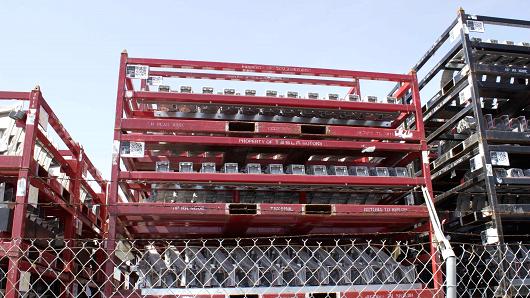
Tesla is struggling to manage and fix a significant volume of flawed or damaged parts from its suppliers, sending some to local machine shops for rework, according to several current and former Tesla engineers. The company said it also makes adjustments to the design of some parts after receiving them from suppliers.
On Friday, Tesla CEO Elon Musk promised the company would be profitable and cash-flow positive in the third and fourth quarter of this year. But a high volume of rework and design tweaks could cut into Tesla’s margins and contribute to delays in the delivery of its cars.
Tesla said such work is being done on a small subset of parts from suppliers and has not constrained or delayed its Model 3 build plan.
Tesla’s future as a mass-market car company hinges on efficient, automated production of the Model 3. The Model 3 is currently the best-selling electric car in the U.S. So far more than 400,000 people have already reserved that vehicle, paying $1,000 refundable fees to do so.
In January, Tesla projected it would make 2,500 Model 3s per week by the end of the first quarter of 2018. On April 3, in a Vehicle Production and Deliveries report, Tesla revealed it had missed that quarterly target.
All automakers have to deal with some amount of defective or damaged parts, both from their own factories and from suppliers. But, as previously reported, current and former employees say that Tesla experiences a higher rate of defects than industry norms. A significant number of flawed parts and parts in need of design changes also come from Tesla’s suppliers, they said.
Current and former employees from the company’s Fremont, California, and Sparks, Nevada, factories blame Tesla for spending less time to vet suppliers than is typical in auto manufacturing. These people said the company failed to perform comprehensive statistical variance testing — used by car makers to estimate the percentage of parts that will fail to meet product specifications — with some vendors before embarking on Model 3 production.
Tesla told CNBC it has a rigorous supplier collaboration process that includes on-site audits, manufacturing capability reviews and other common process controls to predict and eliminate quality issues. It also recently expressed appreciation of its suppliers in its first-quarter vehicle deliveries release.
Piles of parts
Evidence of Tesla’s rework burden stands in plain view in San Jose, California, less than a half-hour drive from the company’s main factory in Fremont. Towering racks and stacks of boxes emblazoned with Tesla’s name stood in the lot beside a sheet metal and machine shop called JL Precision earlier this month.
Current and former Tesla engineers explained that some of the flawed parts made by the company’s suppliers will go to JL Precision and other local shops, including paint shops, for quality evaluation or rework. These people declined to be identified because they were not authorized to talk to the press.
Tesla said it uses JL Precision to add an unspecified coating to some parts.
Labels on the boxes and on racks at JL Precision indicated they contained parts and tooling used to make the Model S, Model X and most of all, the newest Model 3 vehicles. Parts awaiting rework and design tweaks included door frames, doublers, torque boxes, nodes and shock mounts.
Vendors supplying these parts to Tesla included a manufacturing equipment producer, Hongbang Die Casting; Ningbo Tuopu Group, an auto-parts maker that’s publicly traded on the Shanghai stock exchange; and Shiloh Industries, an Ohio company that makes lightweight car parts and materials. JL Precision and these suppliers did not immediately respond to requests for comment.
There were also racks of castings, used to make tooling for Tesla’s own manufacturing operation.
Once the “non-conforming” parts are analyzed and fixed, they can be used either for spare parts or in final vehicle assembly. Outsourcing some rework allows Tesla to avoid wasting materials they’ve paid for already and frees up space in its Fremont factory, where all of its electric vehicles are now produced.
Auto-manufacturing expert Steve Finch, a former GM plant manager with about 40 years of industry experience, said automakers typically deal with some flawed parts from suppliers.
Finch said mass-market car companies normally will take a year or more to vet a prospective supplier. This is to ensure the supplier’s factory follows ISO quality management standards and other processes that are on par with the automaker’s own.
Former and current employees said Tesla took less time before signing on new suppliers. Tesla employees tasked with vetting suppliers were also not always experienced with ISO quality management standards, said these people.
Finch said outsourcing some rework to outside suppliers is “not an unreasonable thing,” however, automakers “will want to avoid having to make decisions that are hugely expensive or could delay production.”
He added automakers usually try to make sure their parts suppliers “are able to make quality parts not just one time but every time well ahead of the start of vehicle production.”
Hanging on to flawed parts from vendors and reworking them locally makes sense when an automaker is constrained by supply or time, Finch said. Sending rework off-site to shops near a factory can help a car company avoid the wait and cost associated with overseas shipping.
Employees attributed outsourcing of rework to the company’s cycles of production. Tesla typically ramps up production at the end of each quarter, with all hands working overtime to make the numbers. Just prior to and after these pushes, more work is outsourced, they said.
Musk has publicly acknowledged that the company is fighting hard to perfect mass-market vehicle production but said in April that it’s been in “production hell.”
